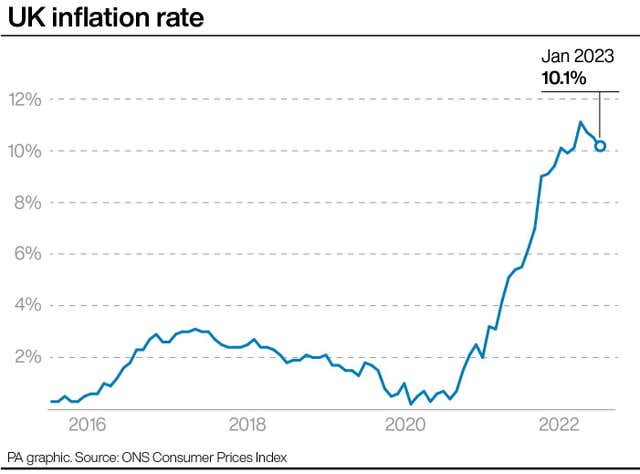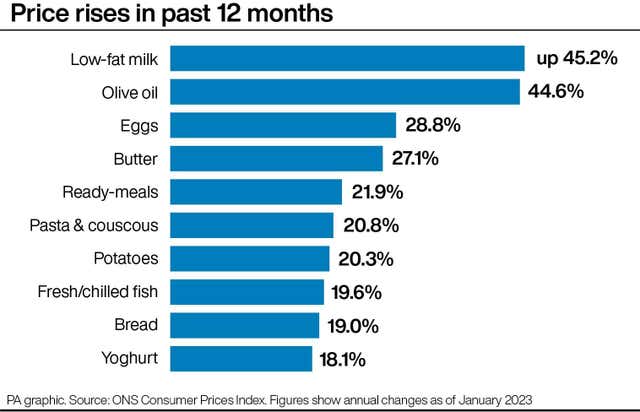Inflation eases back again to 10.1% as air fares and fuel costs come down
The Office for National Statistics revealed Consumer Prices Index inflation dropped by a bigger than expected 10.1% in January from 10.5% in December.

UK inflation has eased back for the third straight month to 10.1% in January as lower air fares and fuel costs helped slow rises in the cost of living, according to official figures.
The Office for National Statistics (ONS) revealed Consumer Prices Index (CPI) inflation dropped sharply from 10.5% in December in a bigger-than-expected fall.
Most economists had been expecting a drop to 10.3% last month.

It marks a further welcome decline from the eye-watering peak of 11.1% seen last October, caused by soaring energy prices.
But with inflation still firmly in double digits, households are yet to feel the pressure lift.
The ONS said food price inflation remained at a 45-year high of 16.8% in January, although the rate including non-alcoholic drinks dipped to 16.7% from 16.8%.
Chancellor Jeremy Hunt said the battle to reduce inflation is “far from over”.
He said: “While any fall in inflation is welcome, the fight is far from over.
“High inflation strangles growth and causes pain for families and businesses – that’s why we must stick to the plan to halve inflation this year, reduce debt and grow the economy.”

The ONS said falls in passenger fares contributed to the drop in inflation, with air tickets seeing the largest fall.
Air fare annual inflation soared to 44.1% in December, but more than halved to 18.4% in January, the figures show.
Road transport fares such as coach travel also declined sharply, with inflation at 5.7%, down from 11.3%, while bus fares also eased, thanks largely to the £2 cap on single bus fares, which came into effect in England from January 1.
Grant Fitzner, chief economist for the ONS, said: “Although still at a high level, inflation eased again in January.
“This was driven by the price of air and coach travel dropping back after last month’s steep rise.
“Petrol prices continue to fall and there was a dip in restaurant, cafe and takeaway prices.”
He added: “The cost of furniture decreased by more than this time last year, in line with traditional New Year discounting. These were offset by rising prices for alcohol and tobacco, following on from seasonal price cuts in December and a more subdued rise at the same time last year.”
Motor fuel prices helped further slow the pace of inflation, with average petrol prices falling 5.9p a litre between December and January to stand at 149.4p per litre last month – the lowest since February 2022.
The Bank of England has said it believes CPI will fall sharply this year, with governor Andrew Bailey recently saying there has been a “turning of the corner” on inflation.
This is due to falling fuel prices and as supply chain difficulties have eased, while wholesale energy prices have also dropped significantly since the painful costs seen last year.
The Bank is forecasting inflation to fall to around 4% towards the end of this year.
It raised interest rates from 3.5% to 4% in February and there has been speculation that may have been the last hike due to the lower inflation outlook.
But there may be pressure on the Bank to raise interest rates again in March after official figures on Tuesday showed regular wages rising by 6.7% in the three months to December – a new record outside the pandemic and a worrying sign that inflation may prove stubborn.
The latest data also showed a decline in the CPIH measure of inflation recorded by the ONS, down to 8.8% from 9.2% in December.
The Retail Prices Index (RPI) remained unchanged at 13.4% in January.





